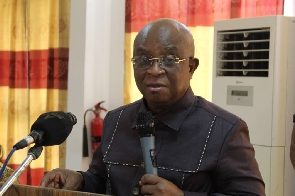 Volta Regional Minister, Dr. Archibald Letsa
Volta Regional Minister, Dr. Archibald Letsa
Volta Regional Minister, Dr. Archibald Yao Letsa, has underscored the need to explore innovative strategies and forge partnerships that will propel the country’s blue economy to new heights.
“It is our collective responsibility to address challenges faced by the ocean head-on, while forging a sustainable path toward harnessing the blue economy’s potential,” said Dr. Letsa, who is also the Dean of regional ministers.
A blue ocean economy refers to the sustainable use of ocean resources for economic growth, improved livelihoods and jobs while preserving the ocean ecosystem.
With a coastline of about 550 kilometres – extending to about 200 nautical miles seaward and making up a total exclusive economic zone of over 218,000 square kilometres, the country is well-positioned to benefit from the world’s ocean resources if sustainably managed.
Currently, the fisheries sector alone supports the livelihoods of some 2.5 million Ghanaians and contributes about 4 percent to gross domestic product.
However, the ocean faces significant threats of marine and nutrient pollution, resource depletion and climate change – all of which are caused primarily by human actions.
Plastics, for instance, account for 85 percent of all marine litter in the country, according to the Coordinating Dean-Kwame Nkrumah University of Science and Technology (KNUST), Obuasi campus, Prof. Richard Buamah.
This will nearly triple by 2040, adding 23 to 37 million metric tonnes of waste to the ocean per year – about 50 kilogrammes of plastic waste per metre of coastline.
These threats place further pressure on environmental systems like biodiversity and natural infrastructure, while creating global socio-economic problems including health, safety and financial risks.
Against this background, Dr. Letsa – speaking at a Blue Economy Summit in Accra – emphasised the country’s need to be deliberate and strategic in its efforts to tap into the vast opportunities offered by the blue economy and leverage them for socio-economic development.
“We need to significantly boost private sector investment in the sector; support the uptake and deployment of science, technology and innovation; deepen ocean knowledge; and build strong partnerships,” he stated.
Convinced that the ocean is the future for the country’s development, Dr. Letsa further called for heightened public-private partnerships to attract investments and foster innovation in the blue economy sector.
“This will be central to the transformation we so dearly desire,” he stated.